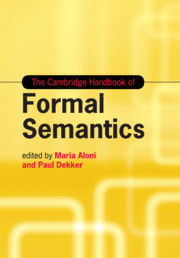Book contents
- Frontmatter
- Contents
- List of figures
- List of tables
- List of contributors
- Preface
- Part I The landscape of formal semantics
- Part II Theory of reference and quantification
- Part III Temporal and aspectual ontology and other semantic structures
- Part IV Intensionality and force
- 16 Negation
- 17 Conditionals
- 18 Modality
- 19 Questions
- 20 Imperatives
- Part V The interfaces
- Bibliography
- Index
19 - Questions
from Part IV - Intensionality and force
Published online by Cambridge University Press: 05 July 2016
- Frontmatter
- Contents
- List of figures
- List of tables
- List of contributors
- Preface
- Part I The landscape of formal semantics
- Part II Theory of reference and quantification
- Part III Temporal and aspectual ontology and other semantic structures
- Part IV Intensionality and force
- 16 Negation
- 17 Conditionals
- 18 Modality
- 19 Questions
- 20 Imperatives
- Part V The interfaces
- Bibliography
- Index
Summary
Introduction
In this chapter we give an overview of the research area which studies the meaning of questions. We start with explaining some general notions and insights in this area, and then zoom in on the three most influential semantic theories of questions, which all attempt to characterize question meaning in terms of “answerhood conditions”. (They are thus following up on the notion of “truth conditions” as the core notion of a formal semantics for indicative sentences.) Next, we discuss some special topics in the study of questions and answers, where we focus on issues which are concerned with identity and questions which have to do with scope. Finally, we describe some pragmatic features of answering questions and the general role that questions play in the dynamics of discourse, leading up to a concise introduction of the recent framework of inquisitive semantics.
Questions can be studied from various perspectives. For a syntactician, questions are linguistic entities, sentences of a certain kind with distinctive formal features. In English they typically display a change in word order (Is Marco smart? versus Marco is smart), they host wh-expressions with characteristic syntactic features (who, what, where, how, but also which students, which Canadians and the like), and in spoken language a question normally, but not invariably, comes with specific intonation, while in written language it is accompanied by a question mark.
For a semanticist, questions are abstract objects taken as the denotations of the above-described type of syntactic expressions. A semanticist here may take his cue from the (formal) study of indicative sentences. There the aim is to uncover a domain of denotations (labeled “propositions” mostly), as, for instance, an algebra which hosts logical constructions (like that of conjunction, disjunction, negation) and logical relations (like entailment, synonymy, and (in-)consistency). In the semantic study of interrogatives the aim is to establish a corresponding domain of denotations that underlies suitable notions of question entailment and answerhood.
From a pragmatic perspective, questions are essentially events in a discourse or dialogue. In response to the utterance of an interrogative sentence onemay legitimately ask “Was that a question?” Questions, then, are certain acts in a conversation the very performance of which is subject to linguistic and pragmatic rules.
- Type
- Chapter
- Information
- The Cambridge Handbook of Formal Semantics , pp. 560 - 592Publisher: Cambridge University PressPrint publication year: 2016
- 15
- Cited by

